The Samsung 850 EVO 4TB SSD Review
by Billy Tallis on July 11, 2016 10:00 AM ESTRandom Read Performance
The random read test requests 4kB blocks and tests queue depths ranging from 1 to 32. The queue depth is doubled every three minutes, for a total test duration of 18 minutes. The test spans the entire drive, which is filled before the test starts. The primary score we report is an average of performances at queue depths 1, 2 and 4, as client usage typically consists mostly of low queue depth operations.
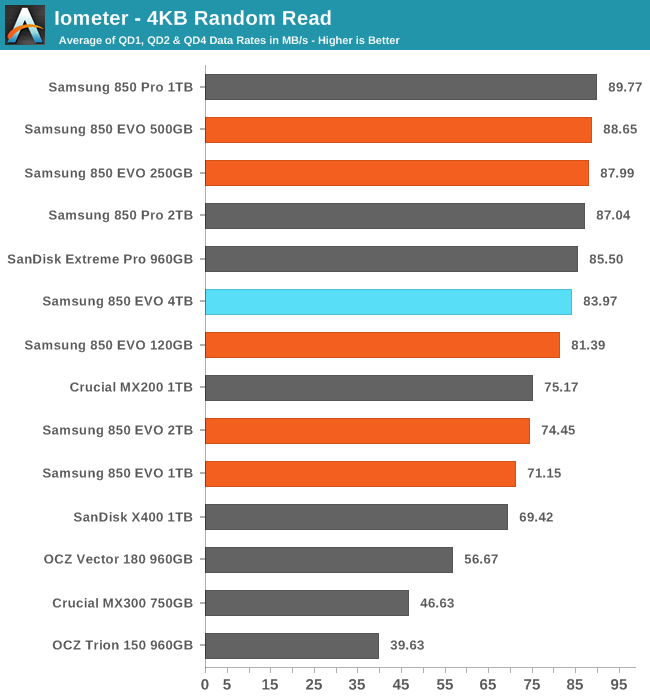
Random read performance of the 4TB 850 EVO is substantially better than the 1TB and 2TB 850 EVOs, but still not quite as fast as the best MLC drives or the 500GB and 250GB 850 EVOs.
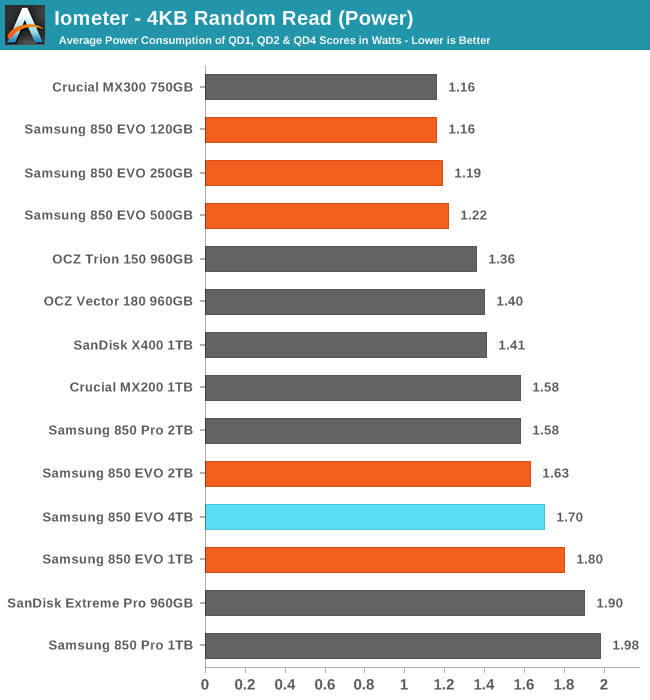
The power consumption of the 4TB 850 EVO is slightly higher than the 2TB model, but overall the efficiency is improved over the smaller drive with the same controller but older NAND.
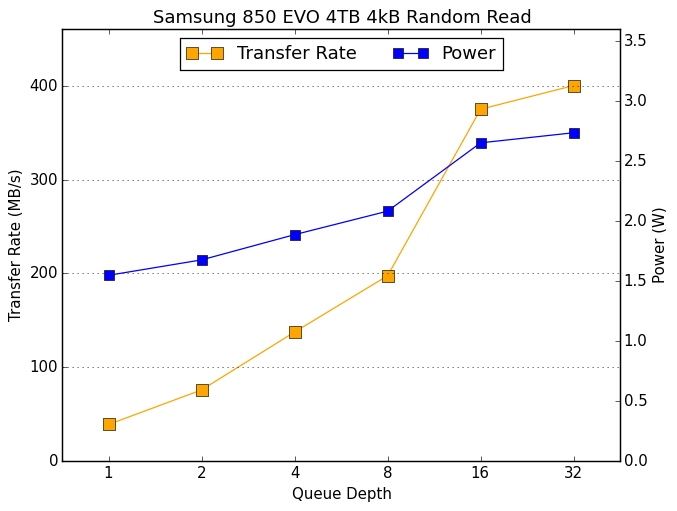 |
|||||||||
The scaling behavior of the 4TB 850 EVO is almost identical to the 2TB model, just with slightly higher performance and power consumption across the board.
Random Write Performance
The random write test writes 4kB blocks and tests queue depths ranging from 1 to 32. The queue depth is doubled every three minutes, for a total test duration of 18 minutes. The test is limited to a 16GB portion of the drive, and the drive is empty save for the 16GB test file. The primary score we report is an average of performances at queue depths 1, 2 and 4, as client usage typically consists mostly of low queue depth operations.
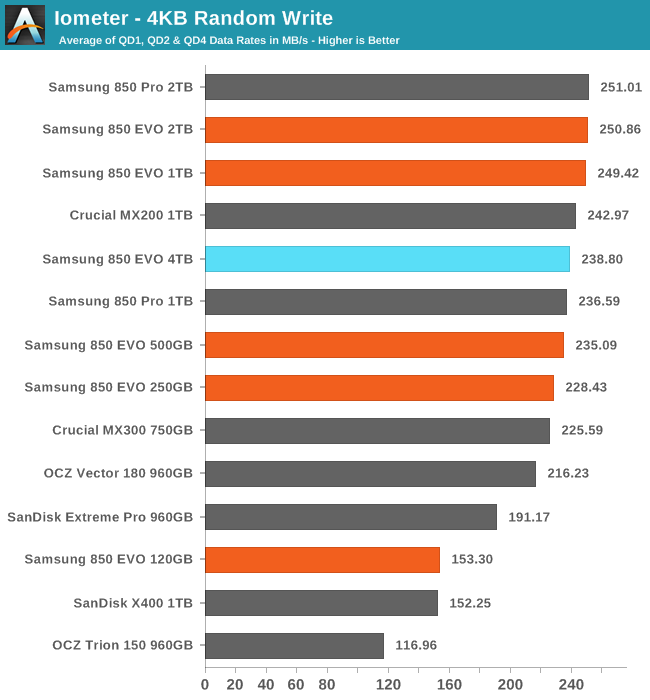
Random write speed for the 4TB 850 EVO is a little bit slower than for the 1TB and 2TB models, but still fast enough to beat almost all non-Samsung drives.
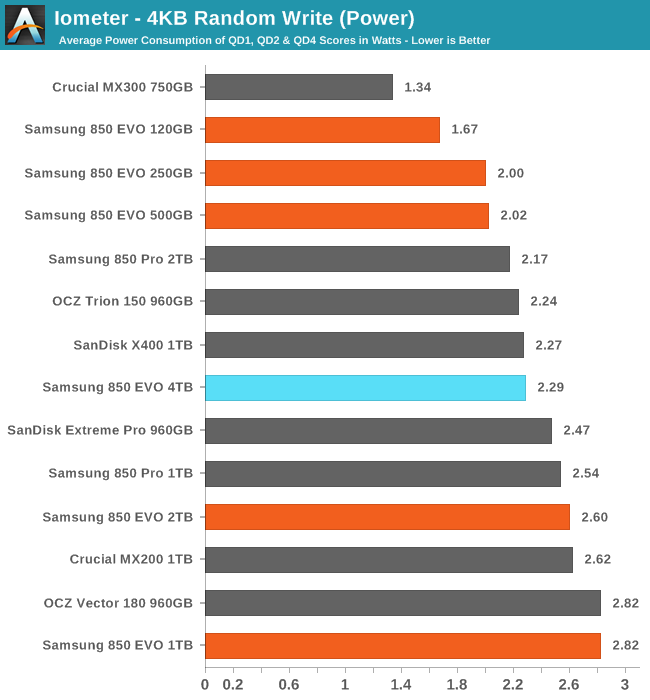
Power consumption of the 4TB 850 EVO is substantially better than the 1TB and 2TB counterparts, making it one of the most efficient large drives. The 750GB Crucial MX300 was still much more efficient.
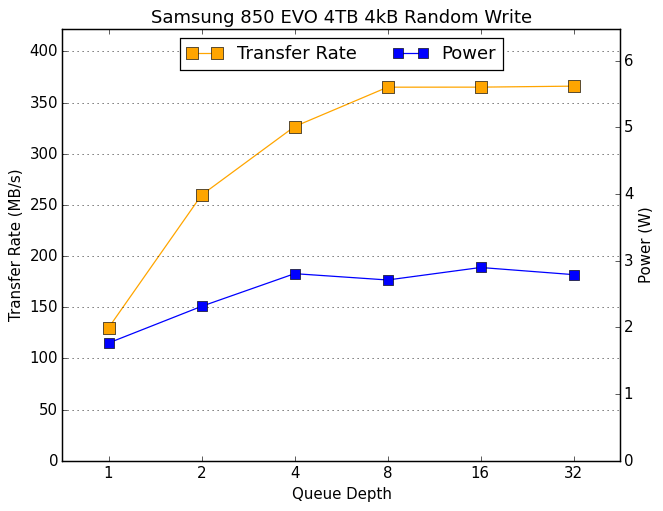 |
|||||||||
The lower performance score for the 4TB was apparently due to a regression in QD4 performance, where the 1TB and 2TB models were able to reach full speed but the 4TB needs a larger queue.










145 Comments
View All Comments
ACE76 - Monday, July 11, 2016 - link
http://www.fudzilla.com/news/memory/39668-mushkin-...Wait for this....any company that releases something first, price gouges.
JellyRoll - Monday, July 11, 2016 - link
The "21nm" is the BL half pitch. The EE Times article does not say that they shrunk from 40 to 21 for the overall measurement.Billy Tallis - Monday, July 11, 2016 - link
Yep, I misinterpreted that. They haven't changed the lithography, but they've shrunk some parts of the die through other means.amayii - Monday, July 11, 2016 - link
Why wasn't the Samsung 950pro taken into account in the benchmark?Is is because it is a NVMe SSD?Solidstate89 - Monday, July 11, 2016 - link
Of course that's the reason. We all know a PCI-e/M.2 SSD (whether it uses NVMe or not) will blow the pants off any SATA SSD when it comes to performance numbers.There is no reason to compare them.
amayii - Monday, July 11, 2016 - link
Ok, thanks!Samus - Monday, July 11, 2016 - link
This drive cost more than my whole PC :/Notmyusualid - Tuesday, July 12, 2016 - link
Ha ha, thanks for putting it into perspective!Made me smile.
doggface - Monday, July 11, 2016 - link
I would hope that when a manufacturer moves to a new process there would be a corresponding drop in $/GB. To be moving to 48layer and still charging ~30c is worrying. Needs to be a third of that to be anything other than a wet dream for consumer.The theorised ssd takeover of HDDs doesnt seem to be materialising yet.
Kristian Vättö - Monday, July 11, 2016 - link
A new process doesn't mean immediate cost savings. It takes time for yields to mature and even then 48L has more process steps than 32L. Ultimately it's a game of economics. Why would you sell something for 10c when the competition is charging 30c? For companies it's always all about the profit.